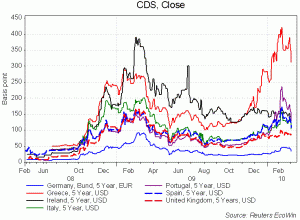An excellent, absolutely must-read piece in this weekend’s Wall Street Journal – The Yuan Scapegoat – and a timely rejoinder to calls for China to orchestrate a revaluation of the Yuan so that all will be well with global imbalances, US trade deficit etc.
And before we get started, those of you not familiar with the deep interdependence of the America and Chinese economies could have it summed up as what the excellent Niall Ferguson calls Chimerica;
Back to the WSJ piece. Ok, so China pegs its Yuan to the dollar at about 6.83 and if it was floating, it would be worth a lot more because of the US recession and continued growth in China. However, the point is that currency pegs are not just about mercantilism – far from it. They are also about exchange rate stability and stable monetary policy. Those were after all the two main reasons for the creation of the Euro (thank God we never joined it!) and all the legion currency pegs that have existed in the past and continue to exist today.
The WSJ leader adds that “China is right to resist calls for devaluation, not least because a large revaluation could damage growth. China has learned from the experience of Japan, which bowed to similar US currency pressure in the 1980s and 1990s” which as we all know was followed by a prolonged bout of deflation and near zero growth. Less observed though is that Japan continued to run a trade surplus, as imports fell with slower internal growth and cross-border prices adjusted. Whilst conceding that the current situation is not ideal, a far better solution to the revaluation says the WSJ would be to address the shortcomings of the yuan’s development as a tradable currency and disintermediate China’s central bank who keeps buying US T-Bills or Fannie Mae Securities which it calls a huge misallocation of global resources. What the Chinese could do would be to make the yuan convertible (+ a small one-time revaluation to 6.5), and let capital and trade flows adjust through private markets rather than the Chinese Central Bank. All of which sounds pretty sensible to me.
Unlike a spectacularly worse solution that is now being proposed by none other than Paul Krugman, who is actually advocating a 25% surcharge on Chinese goods. As Jeremy Warner cogently observes;
A Chinese recession really matters a lot because as I wrote in Spring 2007 (the May 2008 date shown is incorrect) for World Finance Magazine – The Nightmare of a Chinese Economic Collapse – the country could quite literally implode into a morass of ethnic tensions and profound rural unrest and may even try to maintain unity by lashing out at Taiwan, which America is pledged to defend.
When you start a trade war, you just don’t know where it’s going to end. No doubt, some genius at the European Commission is already thinking about how to implement a 30% import tariff on US goods because the Euro is seriouly over-valued against the US Dollar.
Now back to the real world. Can I just say that I for one, have been very impressed with my Chinese printers – who are cheaper, better, keener and almost as fast thanks to air freight as my local ones. No wonder the price of paper pulp has shot up since last year because of Chinese demand . . .







